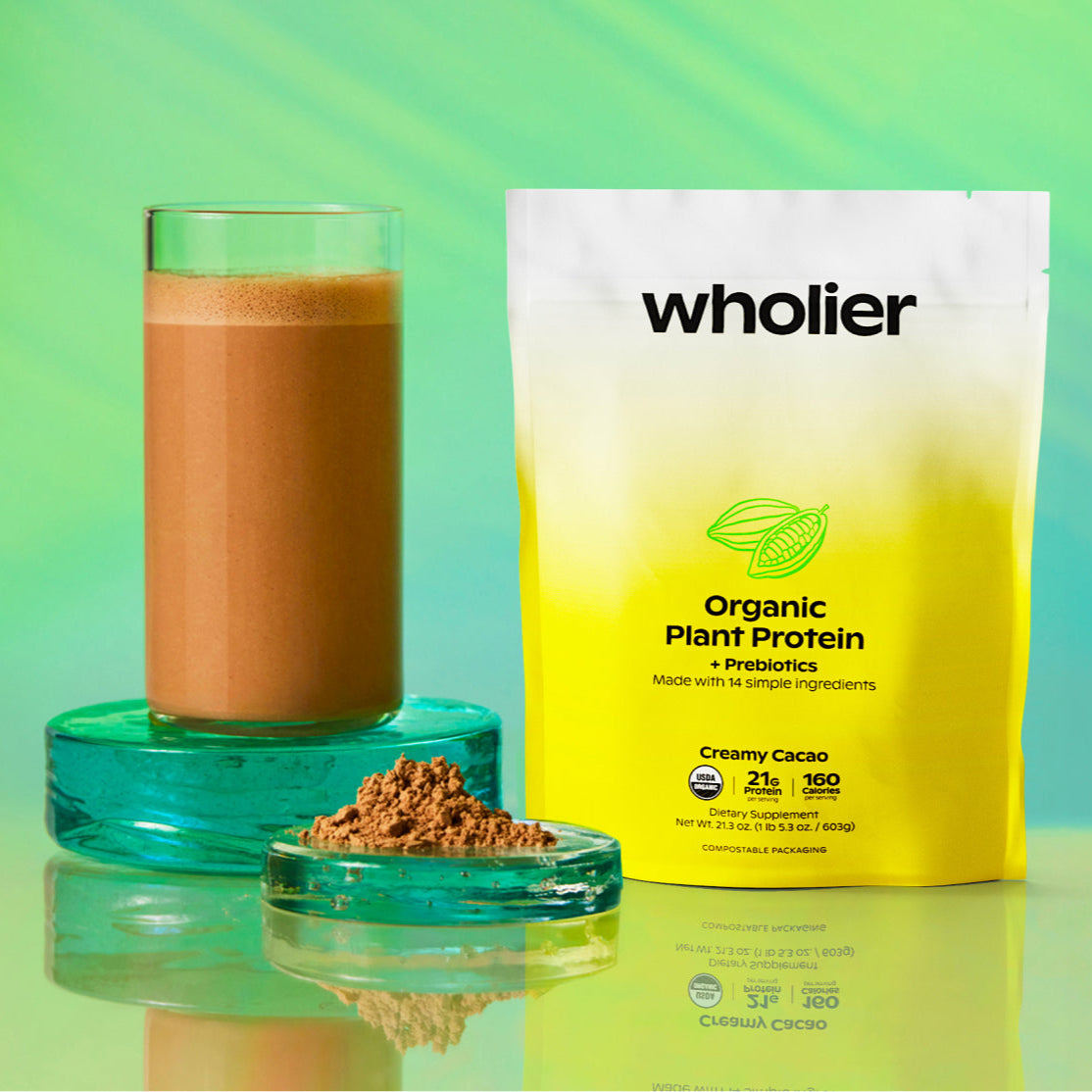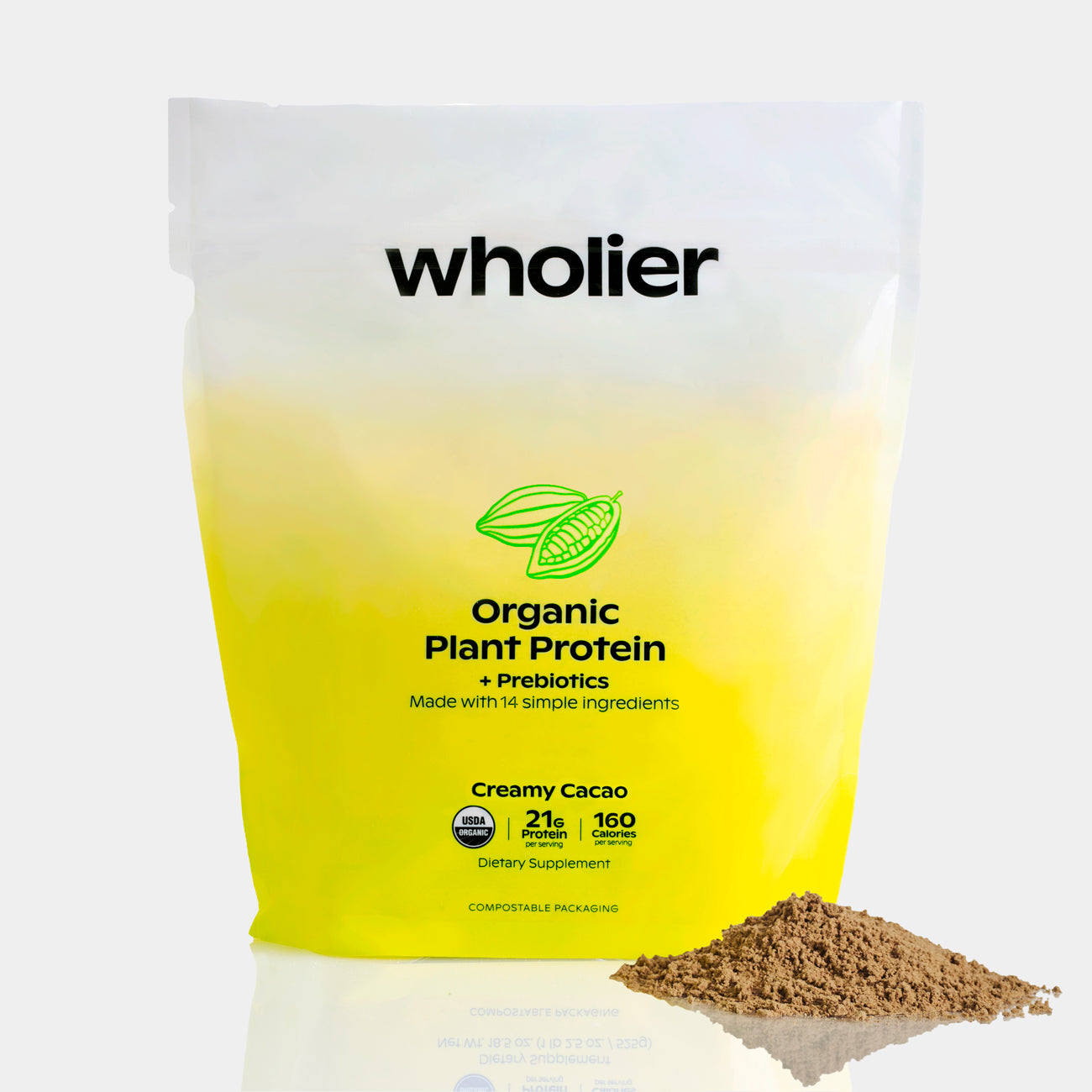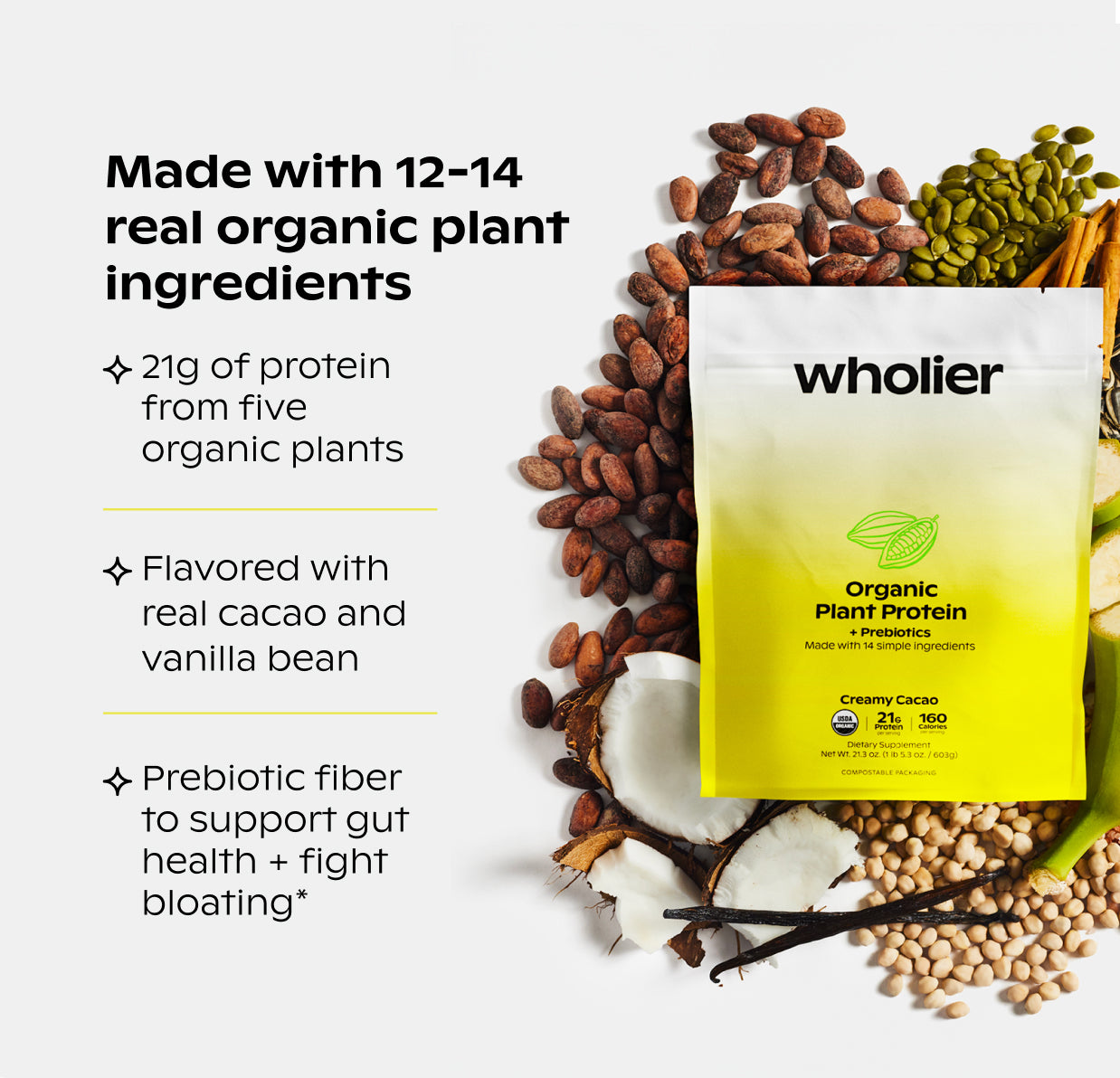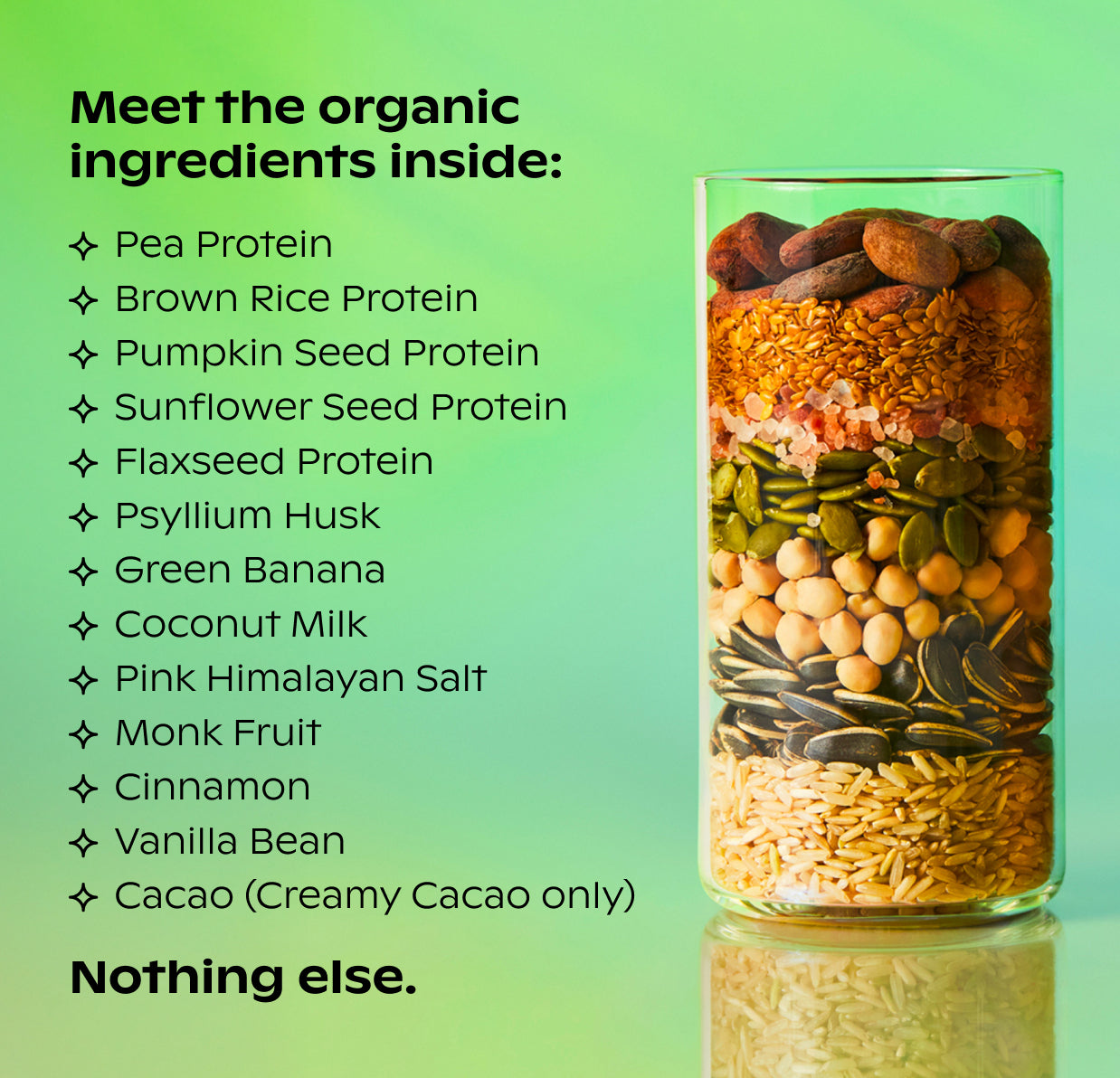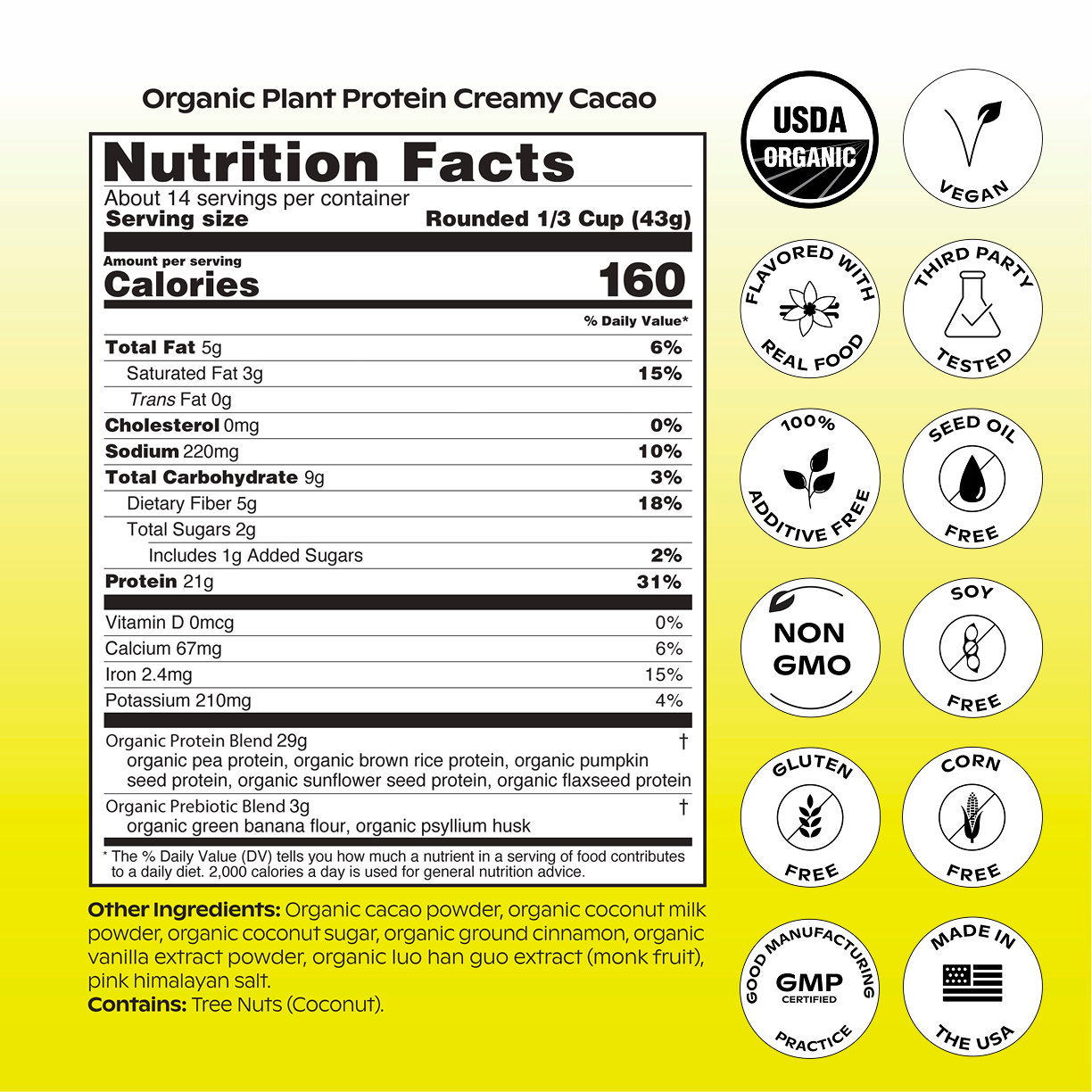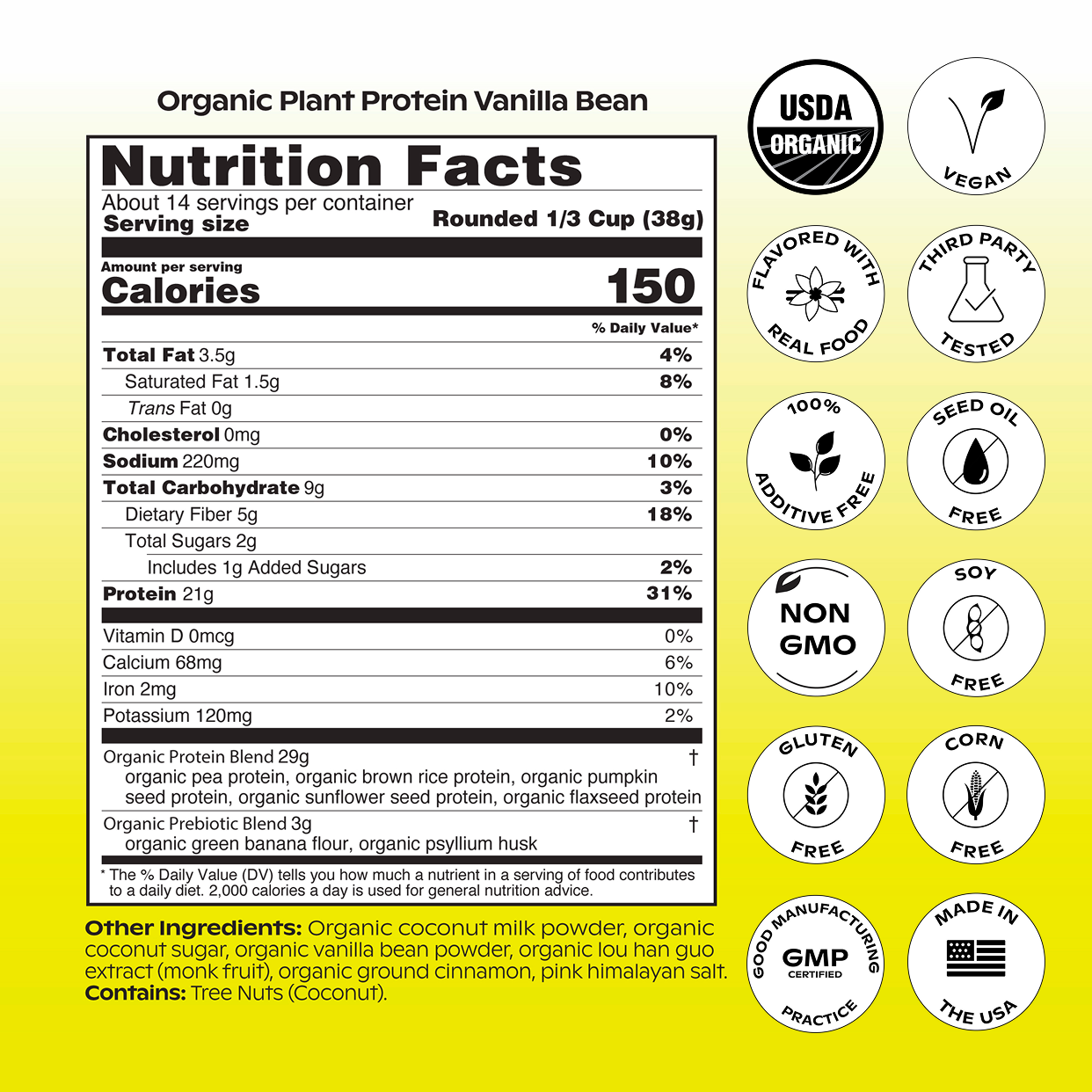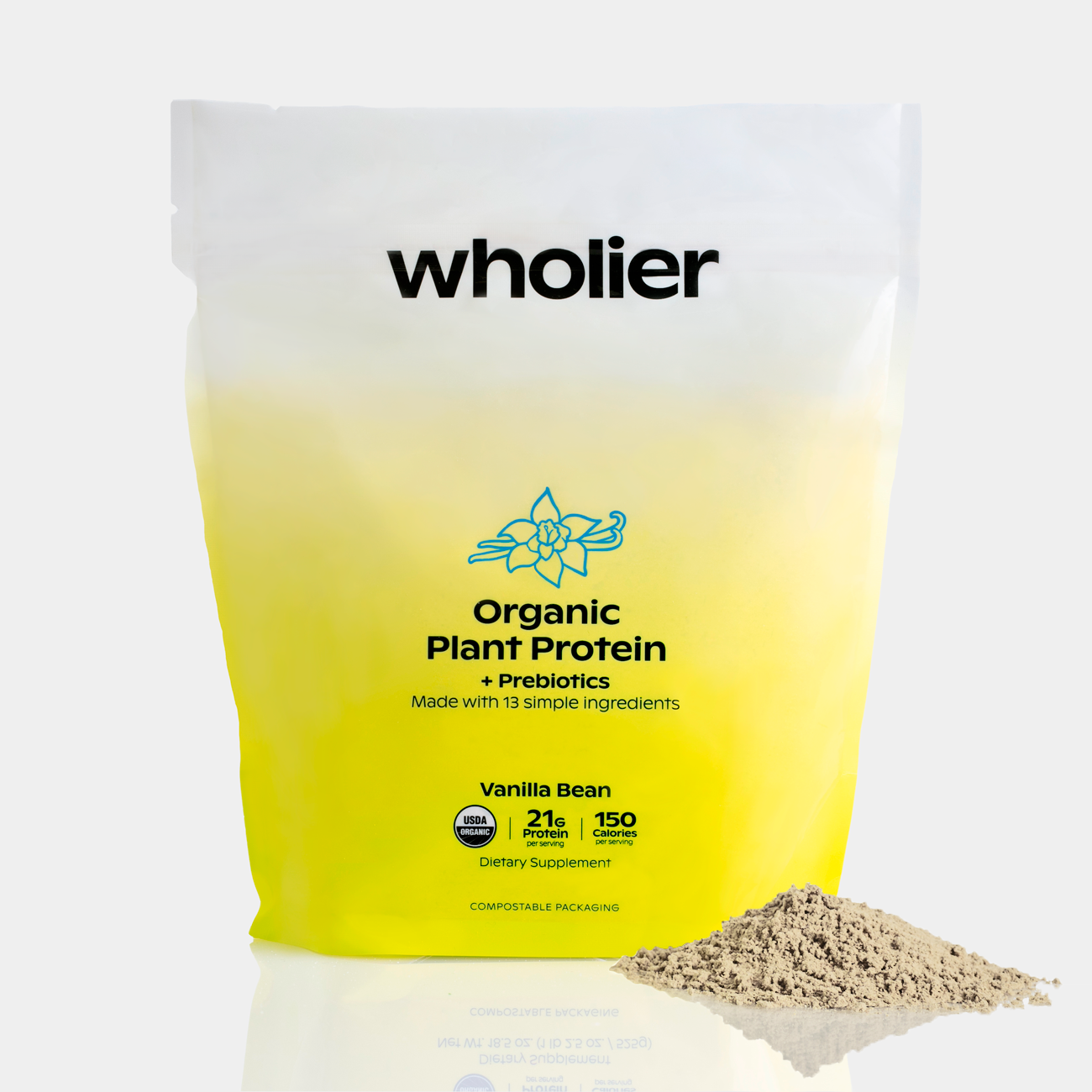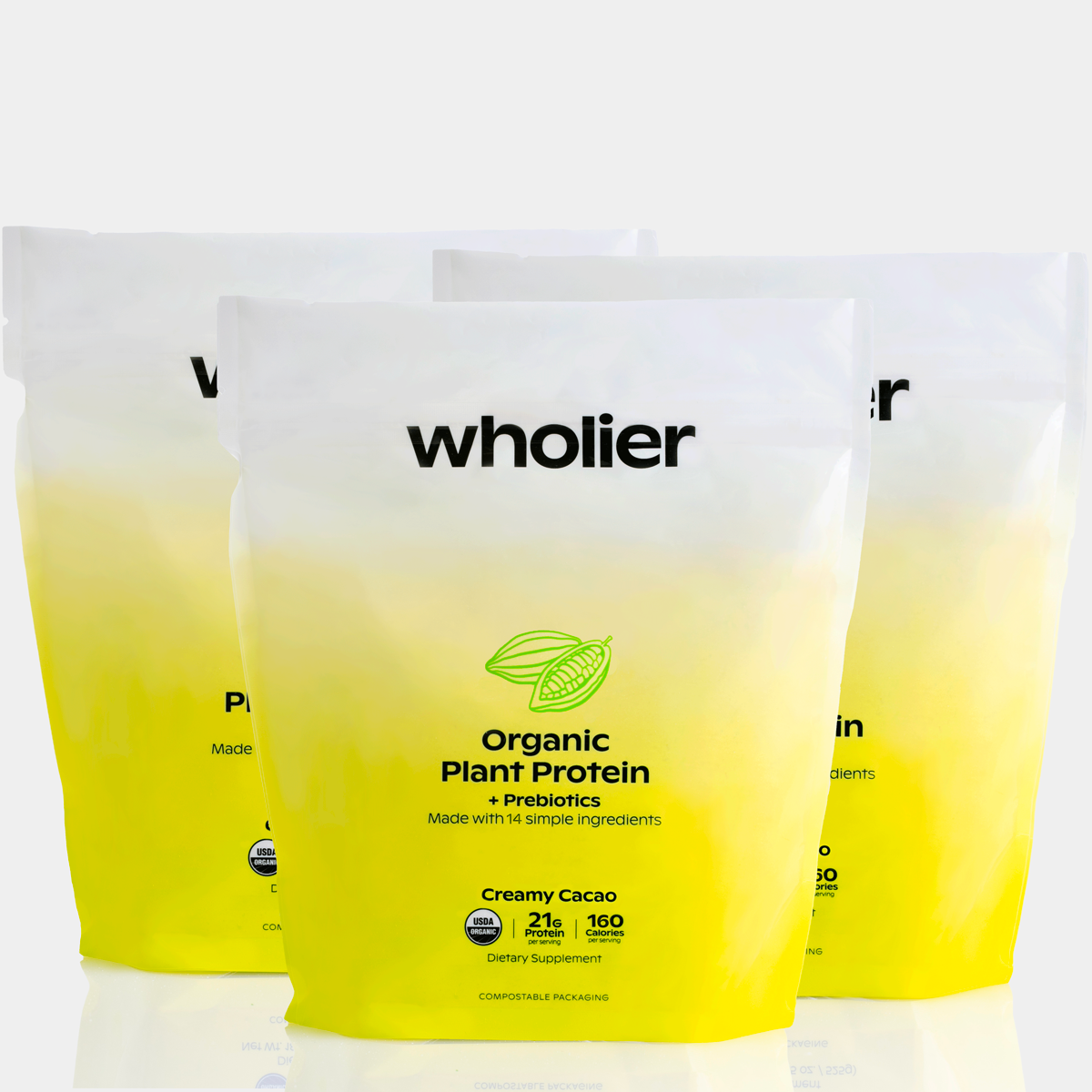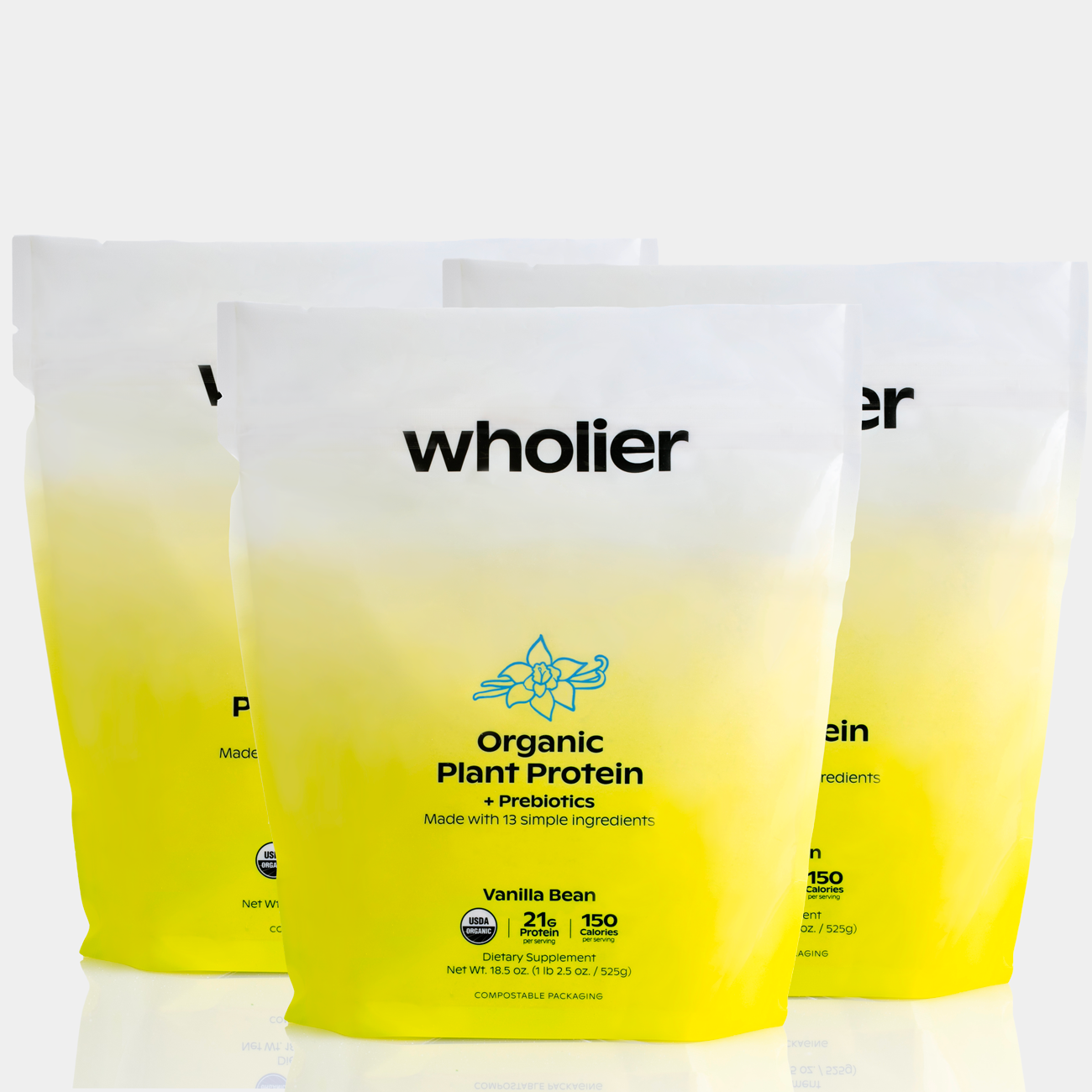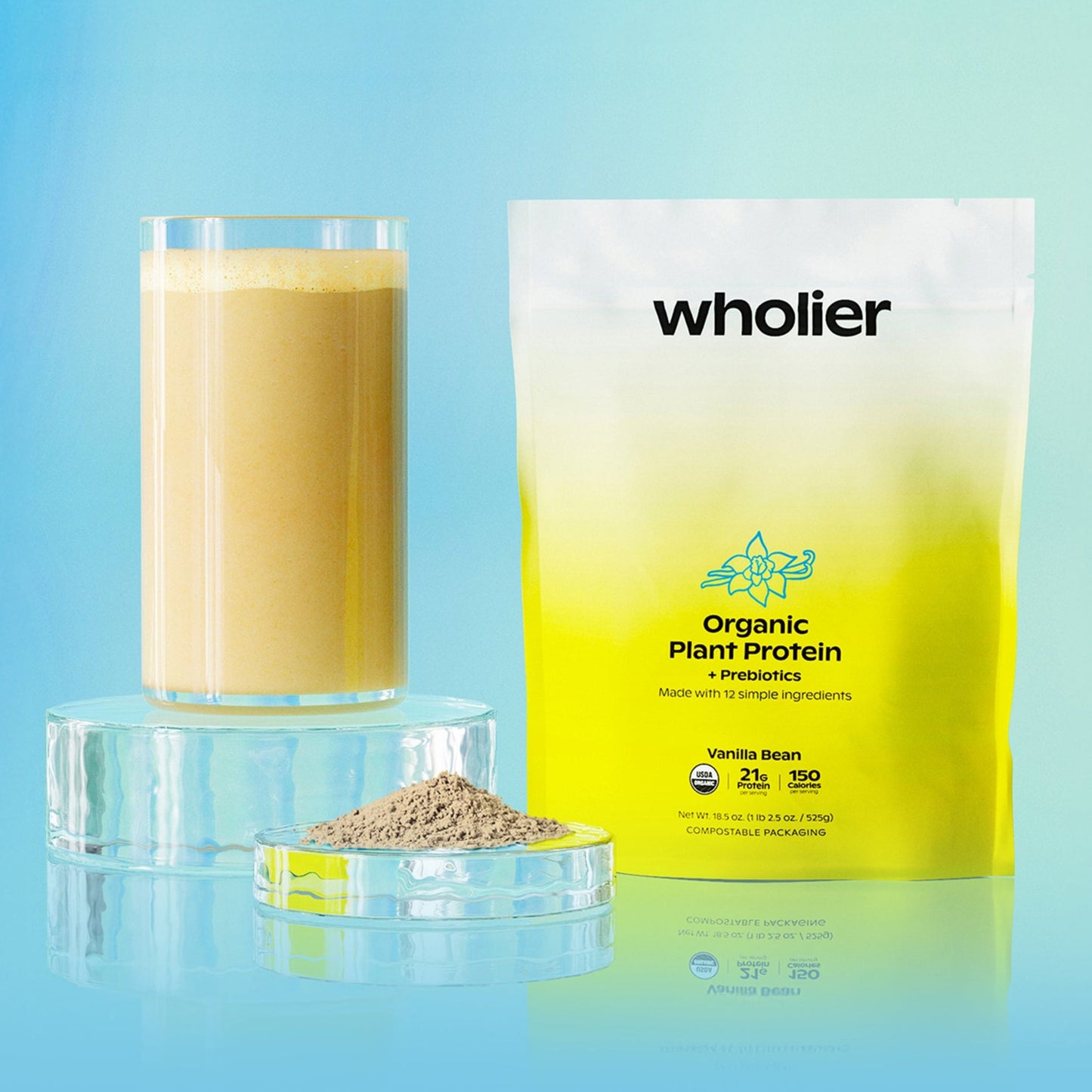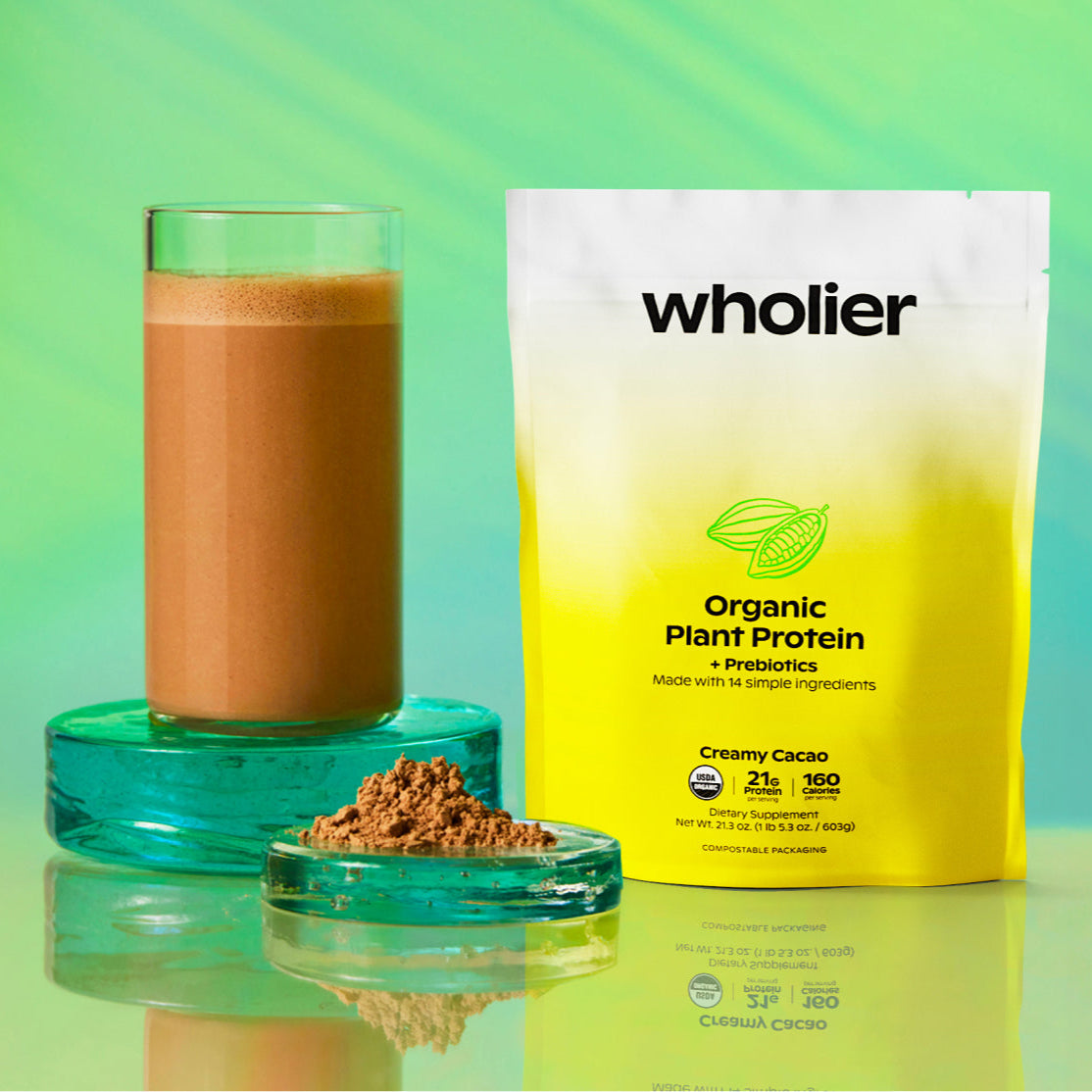Science-backed + consciously sourced
We’re intentional about the vitamins, minerals, and food-based ingredients we use. Learn about their sources and benefits.
Organic Plant Protein with Plant-Based Prebiotics
The deliciously clean protein + prebiotic blend
ORGANIC YELLOW PEA PROTEIN
Benefits
- Digestive Health*
- Boosts Metabolism*
- Muscle Health*
Crafted with Intention
- The full spectrum. Pea protein has a rich amino acid profile including high amounts of lysine, which is often lacking in plants. These essential amino acids are necessary for your body to perform important functions like repairing and rebuilding muscle.
- Easy to digest. The proteins in organic peas are 95–98% digestible, allowing for maximized absorption. This means the body gets access to them quickly and can put them to use right away where they are needed most.
Our Difference
In order for a protein to be considered a "complete protein" source, it needs to have all 9 essential amino acids in balanced proportions. Our blend combines both pea and rice proteins to create a more complete amino acid profile. Pea protein lacks methionine but contains adequate lysine. Brown rice protein is the opposite. It contains high amounts of methionine, but lower amounts of lysine. When combined, the two proteins complement each other to form a balanced amino acid composition.
Source
Organic yellow peas
Harvested in USA
Scientific Research
Babault, Nicolas et al. “Pea proteins oral supplementation promotes muscle thickness gains during resistance training: a double-blind, randomized, Placebo-controlled clinical trial vs. Whey protein.” Journal of the International Society of Sports Nutrition vol. 12,1 3. 21 Jan. 2015, doi:10.1186/s12970-014-0064-5.

ORGANIC FLAXSEED PROTEIN
Benefits
- Digestive Health*
- Anti-Inflammatory*
- Heart Health*
Crafted with Intention
- Nutrient-dense. This plant is filled with beneficial nutrients, omega-3 ALA fatty acids, and fiber.
- Good blood work. The good fats in flaxseeds help reduce blood pressure, prevent artery hardening, and lower “bad” LDL cholesterol.
- Keep it regular. Flaxseeds contain both soluble and insoluble fiber which work together to support digestive health and keep you regular.
Source
Organic flaxseed
Harvested in Germany
Scientific Research
Soltanian N, Janghorbani M. A randomized trial of the effects of flaxseed to manage constipation, weight, glycemia, and lipids in constipated patients with type 2 diabetes. Nutr Metab (Lond). 2018;15:36. Published 2018 May 9. doi:10.1186/s12986-018-0273-z.
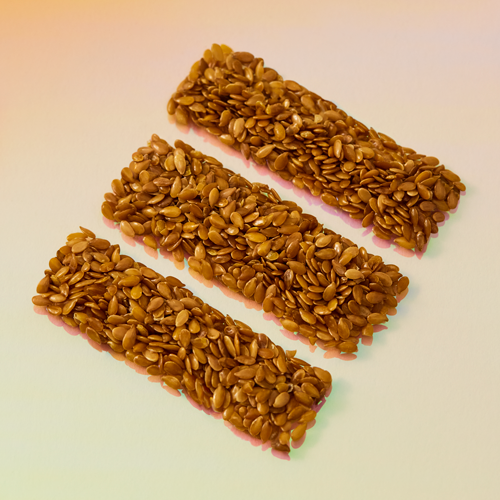
ORGANIC BROWN RICE PROTEIN
Benefits
- Digestive Health*
- Boosts Metabolism*
- Weight Management*
Crafted with Intention
- Satiety that sticks. Ever notice that brown rice keeps you full longer? That’s because it requires a good amount of energy to digest brown rice protein. Your body can keep using those calories long after you’ve finished eating.
- Protein without the bulk. A study found that compared to casein (a protein found in cow’s milk), brown rice protein can help reduce weight gain by 76%.
- The full spectrum. Brown rice protein contains all nine essential amino acids including higher concentrations of some amino acids (like arginine and valine) than can even be found in non-vegan whey protein.
Our Difference
In order for a protein to be considered a "complete protein" source, it needs to have all 9 essential amino acids in balanced proportions. Our blend combines both pea and rice proteins to create a more complete amino acid profile. Pea protein lacks methionine but contains adequate lysine. Brown rice protein is the opposite. It contains high amounts of methionine, but lower amounts of lysine. When combined, the two proteins complement each other to form a balanced amino acid composition.
Source
Organic brown rice
Harvested in Canada
Scientific Research
“Lower weight gain and hepatic lipid content in hamsters fed high fat diets supplemented with white rice protein, brown rice protein, soy protein, and their hydrolysates” by Huijuan Zhang 1, Glenn E Bartley, Cheryl R Mitchell, Hui Zhang, Wallace Yokoyama, Journal of Agriculture and Food Chemistry 2011.
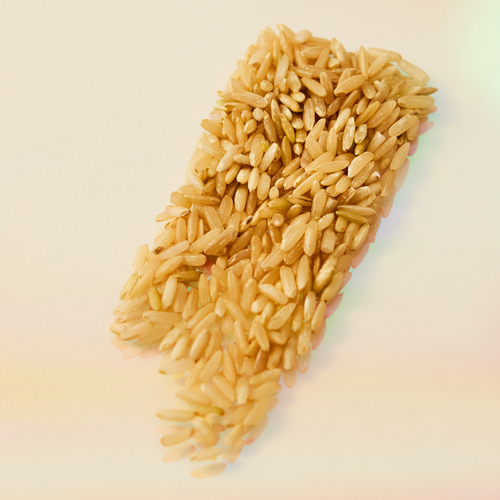
ORGANIC SUNFLOWER SEED PROTEIN
Benefits
- Heart Health*
- Anti-Inflammatory*
Crafted with Intention
- Calm + protect. Flavonoids and other plant compounds in sunflower seeds help reduce inflammation.
- Good blood work. Sunflower seeds contain some of the highest concentrations of phytosterols—a.k.a. plant molecules that are good for reducing cholesterol and promoting heart health.
Source
Organic sunflower seeds
Harvested in Germany
Scientific Research
Guo S, Ge Y, Na Jom K. A review of phytochemistry, metabolite changes, and medicinal uses of the common sunflower seed and sprouts (Helianthus annuus L.). Chem Cent J. 2017;11(1):95. Published 2017 Sep 29. doi:10.1186/s13065-017-0328-7.

ORGANIC PUMPKIN SEED PROTEIN
Benefits
- Digestive Health*
- Anti-Inflammatory*
- Heart Health*
Crafted with Intention
- Calm + protect. Pumpkin seeds contain antioxidants, which can reduce inflammation and protect your cells from harmful free radicals.
- Increased immunity. Antioxidants and zinc in pumpkin seeds may reduce the risk of disease and improve digestion.
- Good blood work. The high magnesium content in pumpkin seeds helps lower and regulate blood pressure.
Source
Organic pumpkin seeds
Harvested in Austria
Scientific Research
Sturniolo, G C et al. “Zinc supplementation tightens "leaky gut" in Crohn's disease.” Inflammatory bowel diseases vol. 7,2 (2001): 94-8. doi:10.1097/00054725-200105000-00003.

ORGANIC GROUND PSYLLIUM HUSK
Benefits
- Digestive Health*
- Gut Health*
- Immune Support*
Crafted with Intention
- Good for the gut. Psyllium husk is a natural prebiotic fiber, which means that it promotes the growth of healthy bacteria in your gut.
- Strengthen your defenses. Colonies of healthy bacteria in the gut help maintain a strong immune system and boost overall health.
Source
Organic psyllium husk
Harvested in India
Scientific Research
Jalanka, Jonna et al. “The Effect of Psyllium Husk on Intestinal Microbiota in Constipated Patients and Healthy Controls.” International journal of molecular sciences vol. 20,2 433. 20 Jan. 2019, doi:10.3390/ijms20020433.
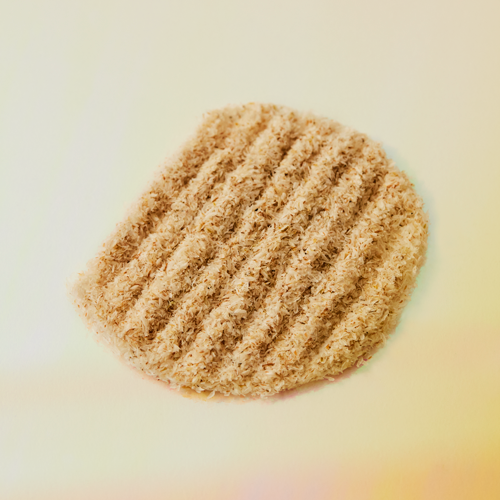
ORGANIC GREEN BANANA
Benefits
- Digestive Health*
- Gut Health*
Crafted with Intention
- Good for the gut. Some studies suggest that these unripe bananas have the highest grade and level of resistant starch of any food in the world. This starch acts as a prebiotic by feeding the good bacteria in your gut.
- Strengthen your defenses. The powerful resistant starches reduce the prevalence of potentially harmful bacteria in your large intestine.
Source
Organic young bananas
Harvested in Colombia
Scientific Research
Jiang, Huanhuan, et al. "Digestibility and changes to structural characteristics of green banana starch during in vitro digestion." Food Hydrocolloids 49 (2015): 192-199.

ORGANIC COCONUT MILK
Benefits
- Weight Management*
- Heart Health*
- Immune Support*
Crafted with Intention
- Satiety that sticks. Several studies have found that consuming MCTs (medium-chain triglycerides), which are present in coconut milk, can help promote a healthy weight by decreasing appetite and increasing energy.
- Strengthen your defense. One of the most remarkable benefits of coconut milk lies in its ability to boost immune function. Lauric acid, a medium chain saturated fatty acid in the coconut fruit, exhibits antimicrobial and anticancer properties.
- Protect your heart. MCT oil can help lower LDL (the “bad”) cholesterol while also increasing your HDL (the “good”) cholesterol. In turn, this can reduce your risk of heart disease.
Our Difference
Most protein powders use gums (like the commonly found xanthan gum) to achieve the desirable creamy texture. Our blend uses coconut milk which achieves the same blendability and offers notable health benefits.
Source
Organic coconuts
Harvested in Sri Lanka
Scientific Research
Mumme, Karen, and Welma Stonehouse. “Effects of medium-chain triglycerides on weight loss and body composition: a meta-analysis of randomized controlled trials.” Journal of the Academy of Nutrition and Dietetics vol. 115,2 (2015): 249-263. doi:10.1016/j.jand.2014.10.022.

Organic Plant Protein + Prebiotics
Share
